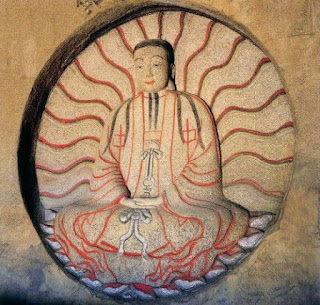It's difficult to imagine Amin Maalouf's The Gardens of Light exceeding what it accomplishes. The Lebanese-born French author recounts the life of the prophet Mani, who founded the (now-dead) Manichaean religion. Historically, Mani (216-274/7?) lived during the Sassanian Empire—in a place for a long time known as Persia and, in the twenty-first century, which we know for its human rights abuses and increasingly fed-up population: Iran.
Maalouf's book takes us through the life of Mani and, unlike a Hollywood Based on a True Story, Maalouf clearly has taken the time to do his research, which is not easy. Books on Manichaeism are a real pain in the ass to find and are kinda pricey, too, both things I imagine were compounded when Maalouf was writing this due to the internet not being as prevalent (read: nonexistent).
If you wanted a one-volume book on Manichaeism that's as close as you're going to get to a life of its founder and summation of its teachings, this is about as good as you're going to get. Admittedly, that is quite a niche thing to want. There are, of course, a few minor differences: for instance, the book's 'White-Clad Brethren,' the Jewish Christian sect Mani grew up in, we know was actually the Elcesaites. I also do not believe the character of Malchos has a historical basis. Little quibbles like that, however, are not the sort of thing to get caught up on, as Norwich discusses regarding telescoping of historical events in Shakespeare. One purpose a fictionalized account like this is read is to breathe life into stories that otherwise might not interest people.
Keeping with history, Mani grows up within the White-Clad Brethren (Elcesaites) after his father, far from a sympathetic character wrenches him from his mother and joins them (less historically based). The tensions within the cult as recounted in the book may or may not be accurate, but in real life we do know that Mani ultimately did decide to depart from the Elcesaites after having visions from what he saw as his 'celestial twin' (and as much as I like Mani, what we'd probably today call a manifestation of some kind of mental illness, especially given the cult upbringing).
A trip to India earns him connections among the Sassanian elite—but also an enemy among some religious groups, particularly seen in the figure of the Zoroastrian priest, Kartir, who seeks to stamp out this new, upstart religion and ensure Zoroastrianism retains state control. (Depending on your historical source of choice, there are some whisperings that the Sassanian ruler Shapur may have considered converting to Manichaeism, and Mani did write a book dedicated to him; my gathering is that the likelihood of his ever truly converting and making Manichaeism the state religion was slim to none. Even if he did, it's a safe bet that through time, we would see its teachings become more belligerent, as when the Christian church traded out the pacifistic St. Martin for the more belligerent St. Michael).
Although we read of Mani's religion spreading, his fame growing, and such tremendous feats as the creation of the beautiful Arzhang (alas, lost to history), his journey comes to a brutal end under the reign of Bahram I, who has him imprisoned and starved to death. Accounts of Mani's death vary from more to less likely, and this is on the higher end of the likelihood of how it played out (as opposed to being stuffed with straw and burned like a scarecrow or Nic Cage in Wicker Man).
The prose might come across as stilted to some, especially the bits where Maalouf slips into his more narrative tone, something he does intentionally to evoke the historical documents he is often citing at these points. It's one of those things that can be off-putting and give it a bit of a corny or overdramatic air, but I think it works here. As I said when I started: it's difficult to imagine Maalouf, or anyone, exceeding what he accomplished in retelling the story of Mani.



Comments
Post a Comment